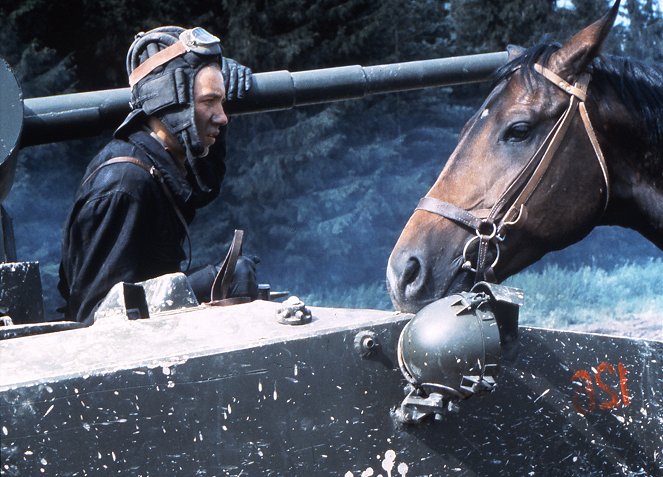Directed by:
Nikita MikhalkovCinematography:
Vilen KalyutaCast:
Oleg Menshikov, Nikita Mikhalkov, Ingeborga Dapkunaite, Nadezhda Mikhalkova, Vjačeslav Tichonov, Svetlana Kryuchkova, Vladimir Ilyin, Alla Kazanskaya (more)Plots(1)
A long summer day in 1936. Colonel Kotov, an aging military hero of the Bolshevik revolution, is enjoying the sweet life in his country house, together with his captivating young wife Maroussia, their six-year-old daughter, and numerous family members and friends. Into this idyllic setting enters Dimitri, a young man who was Maroussia's lover a decade ago, before leaving under mysterious circumstances. Dimitri now works for Stalin's secret police, and it becomes clear that he has returned with an agenda. (official distributor synopsis)
(more)Reviews (7)
Even though the film has a slow pace, you definitely don't feel like nothing is happening. It's as if it's all heading towards something big, and given the peaceful development, you'll get the feeling that that something big won't be very pleasant. It beautifully captures human nature and human qualities, but also landscape and tranquility in contrast to something lurking in the background.
()
When I first saw the film in the 1990s, it had a profound effect on me. Today, however, I am a little disappointed with it. I'm not saying it's a bad movie, but it's not worthy of the adoration I felt at the time. Nevertheless, I think it is one of the key works of Russian cinema, so it is worth paying attention to. In particular, I never cease to be fascinated by the alarming contrast between the carefully drawn rural idyll full of poetry and the final dramatic sequence of events. (85%)
()
Michalkov's adept storytelling art, skillfully used within his capabilities, with a determined ambition to unveil the aura of mystery surrounding one of the many dark actions of Stalin's regime, is unquestionable. The unusually used form of probing into an officer's family compels the viewer to ponder the prevailing situation everywhere. However, the two-and-a-quarter-hour narration through the most tedious possible form, consisting of long dialogue-heavy scenes that (perhaps) lead to "something" progressing the plot, occasionally deviates from its original intention of delivering a certain dose of epicness, which was meant to contrast with the minimalist casting of the family circle. Despite the intentional slow pacing, the film leaves something behind in the viewer after it ends, automatically resonating on a deeper level. And that "something" is not a pleasant thing to think about, even though that was Nikita's point.
()
This film won me over years ago. What I enjoy most about it is the brutal contrast of the relaxed summer idyll with the harsh reality of Stalin's purges, the perfect atmosphere, and the three outstanding performances by Oleg Menshikov, Nikita Mikhalkov, and Nadezhda Mikhalkova. I've said many times how I feel about children in film, but Nadia gave a truly excellent performance as Nadia, albeit mightily supported by her daddy/co-actor/director/screenwriter.
()
In the end, a brilliant indictment of the Stalinist purges in the Soviet army of the late 1930s. At the beginning the film deceives with its body, Michalkov lulls the viewer with a plethora of humorous situations and the depiction of Colonel Kotov's idyllic family life, only to grab them by the throat at the end and strangle them with a demonstration of the practices of NKVD agents. Michalkov and Imbragimbek's film is both kind and terrifying, and the Oscar is in the right hands. And what I would also like to highlight are the performances of all the actors involved, especially Michalkov himself and his real daughter Nadezhda, who is absolutely disarming with her immediacy, as if standing in front of the camera is the easiest thing in the world.
()
Gallery (29)
Photo © Pyramide Distribution


Ads